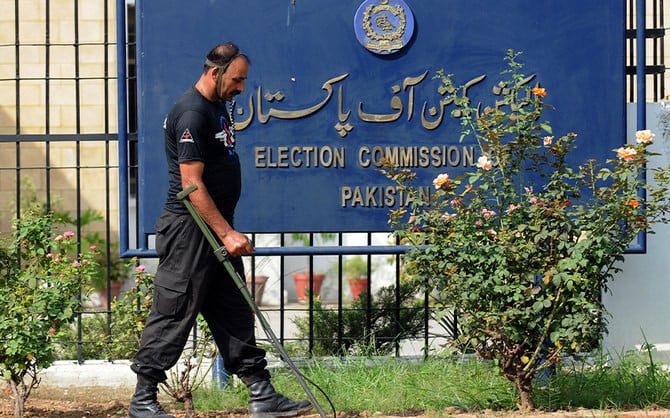—— Just two days before the retirement of half of the senators after completing their six-year term
Staff Report
ISLAMABAD: Still trying to overcome the post-poll challenges amid rigging allegations, the Election Commission of Pakistan (ECP) on Friday announced that the election for the office of the country’s president would be held on March 9 – just two days before the retirement of half of the senators af-ter completing their six-year term.
According to the schedule, candidates vying for the constitutional post of the country can submit their nomination papers until Saturday noon in Islamabad and four provincial capitals – Karachi, Lahore, Peshawar and Quetta.
Nomination papers will undergo scrutiny by the returning officer in Islamabad by 10am on Monday (March 4). The candidates have the option to withdraw their nomination papers before the returning officer in Islamabad until noon on Tuesday (March 5).
On the same day, the list of candidates will be made public. The candidates can opt out of the contest by March 6, and polling is scheduled to take place from 10am to 4pm on March 9 at the Parliament House in Islamabad and the provincial assembly buildings in Lahore, Karachi, Peshawar and Quetta.
The six-party alliance, which formed a coalition government at the Centre under the PML-N’s Shehbaz Sharif, has already announced Asif Ali Zardari as its consensus candidate for the office.
Zardari previously served as the president from September 2008 to 2013 after the resignation of mili-tary ruler Pervez Musharraf.
No other candidate had come forward so far to mount a challenge to the PPP chairman.
Article 41(4) of the Constitution says that “election to the office of president shall be held not earlier than sixty days and not later than thirty days before the expiration of the term of the president in of-fice: Provided that, if the election cannot be held within the period aforesaid because the National As-sembly is dissolved, it shall be held within thirty days of the general election to the Assembly”.
Incumbent President Dr Arif Alvi is already on an extended tenure after completing his five-year term on Sept 9 last year.
Article 44(1) of the Constitution says that the president will hold office for a term of five years from the day he assumes charge, but he continues to hold the office until a successor is chosen.
Dr Alvi is the country’s fourth democratically elected president to complete the five-year term. The three presidents before Dr Alvi who completed their full terms were Chaudhary Fazal Elahi (fifth presi-dent, from 1973 to 1978), Asif Ali Zardari (11th, from 2008 to 2013), and Mamnoon Hussain (12th, from 2013 to 2018).
Therefore, Dr Alvi is the third consecutive president to have a full term and the first one to have an extended term due to an incomplete electoral college, which comprises the National Assembly, Sen-ate and the four provincial assemblies.
The term-wise data of senators suggests that the PML-N and the PPP stand to lose a large chunk of their members — 69 per cent and 57 per cent, respectively — as they retire on March 11 after com-pleting their terms.
But after the Feb 8 polls, both the PML-N and PPP will definitely be able to add to their tally in the Sen-ate. The PTI, however, will be at a definite disadvantage if it fails to conduct the intra-party elections before the Senate polls, and it may have to depend on the SIC to get representation in the upper house of the parliament.
Up until now, the total strength of the Senate has been 100, including 23 members each from the four federating units and four each from erstwhile Fata and Islamabad.
The 23 seats allocated to a province comprise 14 general seats, four reserved for women, four for technocrats and one for a minority member.
This time around, though, only 96 members will grace the chamber as the representation of the erst-while tribal areas will end following their merger with Khyber-Pakhtunkhwa under the 25th Constitu-tional Amendment.
This means that the upcoming elections to the Senate will elect 48 new senators — 11 each from all four provinces on general and technocrats’ seats, two from Islamabad and two minority members from Punjab and Sindh.
At present, the house has 97 members due to the death of PML-N’s Rana Maqbool Ahmed and the resignations of PTI’s Shaukat Tarin and Anwaarul Haq Kakar of the Balochistan Awami Party (BAP) after assuming the office of the caretaker prime minister.
The term of a senator is six years, but half of them retire every three years, and elections are held for new members.




